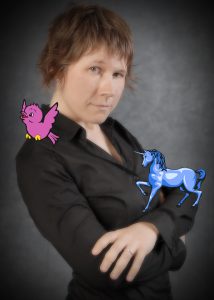The Toronto writer promotes short stories, along with oddballs and outcasts, in her new collection
 Last winter, Jessica Westhead had a run-in that grew into a story in her recently published collection And Also Sharks (Cormorant Books). She and her photographer husband, Derek Wuenschirs, were on an assignment at the Canadian International Auto Show — shooting portraits in front of a green screen — when an amateur photographer squeezed to the front of the line and reconnoitered their operation. “He was being really nosy,” says Westhead. “He was trying to figure out what kind of equipment we were using.” She suffered a few questions and then asked pointedly, “Would you like to get your picture taken, sir?” She gestured toward the back of the line. He looked at her “like a little bug,” wagged his camera in her face, said, “Yeah, I do this,” and walked away. Westhead thought, “I’m gonna write about you, buddy. I’ll get my revenge.”
Last winter, Jessica Westhead had a run-in that grew into a story in her recently published collection And Also Sharks (Cormorant Books). She and her photographer husband, Derek Wuenschirs, were on an assignment at the Canadian International Auto Show — shooting portraits in front of a green screen — when an amateur photographer squeezed to the front of the line and reconnoitered their operation. “He was being really nosy,” says Westhead. “He was trying to figure out what kind of equipment we were using.” She suffered a few questions and then asked pointedly, “Would you like to get your picture taken, sir?” She gestured toward the back of the line. He looked at her “like a little bug,” wagged his camera in her face, said, “Yeah, I do this,” and walked away. Westhead thought, “I’m gonna write about you, buddy. I’ll get my revenge.”
Over a year later and the day after And Also Sharks’ jam-packed release party, I’m sitting at an empty Toronto bar with a slightly hungover Westhead. She doesn’t look like the kind of woman to pick a fight, but one who goes out of her way to say “hi” in a crowded room. She’s cute and pixie-haired and, at 36, still learning to walk in high heels. When not helping out on photo shoots, she transcribes classes for deaf and hard-of-hearing college students. She seems well-adjusted, but over and over again, her stories address themes of confrontation, misunderstanding, neurosis and the refusal to play along.
“I do this,” she says. “That one line’s just so full of menace and insecurity.” Over the last year that line grew into “The Healing Arts,” a story about an amateur photographer who takes the professional’s slight to heart. He and his doormat assistant stalk and beat that “asshole” professional (originally played by her husband) to near-death. In this version, the story’s told from the doormat’s point of view and, if an insider perspective of the sociopathic photographer doesn’t render him sympathetic, at least it lays his insecurities — and with them his humanity — bare.
Violent criminals are at home with Westhead’s collection of kidnappers, shut-ins, perverts, chumps and jerks — characters whose antics reviewers almost invariably call deadpan, if not downright funny. The humour is uncomfortably enhanced by the way Westhead gives us tiny peeks into the psyches of her unreliable narrators, a motley crew for whom morality is as irrelevant as motivation. Narrators are unreliable and in total control. Her script-like spoken parts have been compared to Woody Allen, but I’d say they are more reminiscent of Todd Solondz. Her characters are assholes, but at least they’re honest about it.
Westhead skirts the fine line between examining her characters and ridiculing them. The challenge for her, she says, is to find the loveable qualities within conventionally un-loveable types. It’s a hallmark of her curiosity: to decide something’s silly and then face it head-on. A self-described outsider in high school, she cured her fears of gym class, dancing and social occasions by despising them, flirting with them and surrendering to them in turn. But she still grapples with that initial judgment. She once showed an early draft of her 2007 novel, Pulpy and Midge, to a friend who commented, “it feels like you’re laughing at your characters.”
“Now I watch for that and, if there’s any judgment, I try to have that come out in the early drafts,” says Westhead. “Yes they’re quirky; yes they’re weird. But I want them to be sympathetic.”
 Sympathetic or not, the characters in And Also Sharks have enough depth for Marc Côté, her editor at Cormorant Books, who describes the collection as “15 little novels.” Westhead says she’s flattered, but is quick to point out that the short story is a genre in its own right. It’s a major distinction for Westhead, whose career has gone against the grain of the typical literary trajectory. While most writers cut their teeth on short fiction, Westhead published her novel Pulpy and Midge (Coach House Books) first, after earning an English degree at Trent and joining Toronto’s literary scene. While Coach House publicist Evan Munday says Pulpy and Midge was one of their 2007 bestsellers (it sold over 2,000 copies), she has no immediate intention of going back to novels. “I realized I just think in short stories,” she says. “I love those awkward little interactions between characters, and a story can hinge on those more than a novel can.”
Sympathetic or not, the characters in And Also Sharks have enough depth for Marc Côté, her editor at Cormorant Books, who describes the collection as “15 little novels.” Westhead says she’s flattered, but is quick to point out that the short story is a genre in its own right. It’s a major distinction for Westhead, whose career has gone against the grain of the typical literary trajectory. While most writers cut their teeth on short fiction, Westhead published her novel Pulpy and Midge (Coach House Books) first, after earning an English degree at Trent and joining Toronto’s literary scene. While Coach House publicist Evan Munday says Pulpy and Midge was one of their 2007 bestsellers (it sold over 2,000 copies), she has no immediate intention of going back to novels. “I realized I just think in short stories,” she says. “I love those awkward little interactions between characters, and a story can hinge on those more than a novel can.”
Unfortunately, readers don’t often see it that way. Short fiction doesn’t sell as well as novels do, and Côté says sales of short story collections are wildly unpredictable. “If I knew why short stories don’t generally sell as well as novels,” he says, “I’d do something about it.”
Westhead has taken up that challenge. Banding together with fellow Toronto writers, Sarah Selecky and Matthew J. Trafford, the trio have declared 2011 the Year of the Short Story. This past February, they wrote a manifesto urging publishers and magazines to publish more short stories, and readers to read them more. “We have to stir the pot a little bit,” Westhead says. “It’s a bit of a challenge, because if there’s no discussion happening, then what’s the point?” It’s a challenge that has also been championed by Zsuzsi Gartner and Found Press, among others.
For now, Westhead intends to keep her day jobs. And she’s okay with that. “I don’t want to write in a vacuum,” she says. “Odd jobs inform my writing, because I’m always learning something new.” In the best of times, this means transcribing a cooking class at George Brown; an experience that inspired a character — Teddy from “Ear, Nose and Throat” — who made salad for homework. When things go bad at work, Westhead can at least count on those “I’m gonna write about you” revenge moments to sustain her through a day of drudgery.
“I’m not generally a rebellious person,” she says, “but there is a little bit of rebellion in me that will say, ‘I’m gonna write about you’ — it’s how I keep my identity as a writer. But eventually, ‘I’m gonna write about you’ turns into ‘I want to write about you,’ and in the end, that’s why I write about these people; because I like them.”
Photos by Derek Weunschirs.
